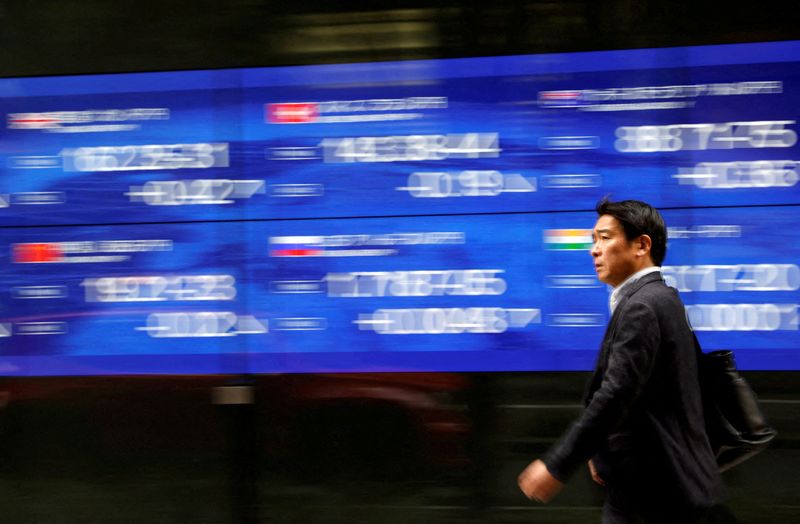Asia in wary mood for US inflation, earnings tests
2023.07.09 21:44

© Reuters. FILE PHOTO: A passerby walks past an electric monitor displaying various countries’ stock price index outside a bank in Tokyo, Japan, March 22, 2023. REUTERS/Issei Kato/File Photo
By Wayne Cole
SYDNEY (Reuters) – Asian share markets edged cautiously higher on Monday as investors looked ahead to a key reading on U.S. inflation and the start of another corporate earnings season.
Bond markets were still shaky after a recent vicious sell-off drove yields to multi-year highs across the developed world, making equities less attractive in comparison.
The surge in yields put pressure on popular carry trades in the currency market which saw the Japanese yen rally sharply late last week, largely at the expense of the U.S. dollar.
The cross currents made for an uncertain background and MSCI’s broadest index of Asia-Pacific shares outside Japan inched up 0.1% in early trade.
firmed 0.3%, while South Korea added 0.1%.
and Nasdaq futures were both little changed, having retreated modestly last week.
Earnings season starts later this week with JPMorgan Chase (NYSE:) , Citigroup (NYSE:), Wells Fargo (NYSE:), State Street (NYSE:) and PepsiCo (NASDAQ:) among the names reporting.
“Consensus expects a 9% year/year decline in EPS driven by flat sales growth and margin compression,” noted analysts at Goldman Sachs (NYSE:).
“We expect companies will be able to meet the low bar set by consensus,” they added. “Negative EPS revisions for 2023 and 2024 appear to have bottomed and revision sentiment has improved.”
This week also has major data on U.S. consumer prices which is forecast to show headline inflation slowed to its lowest level since early 2021 at 3.1%, with the core easing to 5.0%.
Markets still think the Federal Reserve is likely to hike rates later this month, but a weak CPI might lessen the risk of yet a further move in September.
Currently futures imply around a 90% probability of a rise to 5.25-5.5% this month, and a 24% chance of a move in September.
Fed officials have been mostly hawkish in their communications, while market have also priced in higher rates in Europe and the UK. Canada’s central bank meets this week and markets imply a 67% chance of another hike.
The risk of higher global rates for longer has caused havoc in bond markets, where U.S. 10-year yields jumped 23 basis points last week, German yields 24 basis points and UK yields 26 basis points.
Early Monday, U.S. two-year yields stood at 4.946%, having hit a 16-year high of 5.12% last week.
The jump in developed world yields caused ripples in currency markets, particularly in carry trades where investors borrow yen at super-low rates to invest in high yielding emerging market currencies.
The net result was a rush to close yen short positions which saw the Japanese currency rally across the board last week. The dollar was last sitting at 142.30 yen, after sliding 1.3% on Friday, while the euro held at 155.96 yen. The single currency was firm on the dollar at $1.0962.
One of the most popular carry trades has been short yen and long Mexican peso, and the shake out saw the peso dive 1.8% on the yen on Friday.
In commodity markets, gold was steady at $1,923 an ounce after making a slight gain last week. [GOL/]
Oil prices eased in early trade, having touched nine-week highs last week as top exporters Saudi Arabia and Russia announced fresh output cuts. [O/R]
fell 35 cents to $78.12 a barrel, while lost 40 cents to $73.46.








